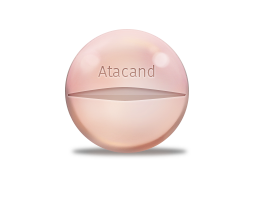 Atacand
Atacand

Atacand is an angiotensin II receptor blocker which is used to treat high blood pressure (hypertension) and heart failure.
- Availability: In Stock (80 packs)
- Active Ingredient: candesartan
| Package | Per Pill | Savings | Per Pack | Order |
|---|---|---|---|---|
| 30 pills | $2.07 | $0.00 | $61.98 | |
| 60 pills | $1.66 | $24.30 | $123.96 $99.66 | |
| 90 pills | $1.31 | $68.04 | $185.94 $117.90 |
| Package | Per Pill | Savings | Per Pack | Order |
|---|---|---|---|---|
| 30 pills | $3.08 | $0.00 | $92.31 | |
| 60 pills | $1.98 | $65.93 | $184.62 $118.69 | |
| 90 pills | $1.79 | $115.94 | $276.93 $160.99 |
| Package | Per Pill | Savings | Per Pack | Order |
|---|---|---|---|---|
| 30 pills | $2.83 | $0.00 | $85.02 | |
| 60 pills | $2.72 | $6.73 | $170.04 $163.31 | |
| 90 pills | $2.41 | $38.04 | $255.06 $217.02 |
Atacand (Candesartan)
General information
Atacand belongs to a family of medications known as angiotensin II receptor blockers. It is used to lower high blood pressure and treat heart failure. It works by relaxing blood vessels. Candesartan blocks the action of angiotensin II, resulting in the relaxation of the blood vessels. This relaxation causes the blood pressure to decrease. Lowering high blood pressure helps prevent strokes, heart attacks, and kidney problems. It takes about 2 weeks for this medication to begin lowering blood pressure, and about 4 weeks for it to reach its full effect.
Directions
Take Atacand exactly as prescribed by your doctor. The usual recommended starting dose is 16 mg once daily at approximately the same time each day, with or without food. This medication should be taken in the same manner each day. Your doctor may decide to increase the dose to 32 mg once a day if blood pressure has not decreased enough. A diuretic may also be added to help reduce the blood pressure. The recommended starting dosage for people with congestive heart failure is Atacand 4 mg once a day. Every couple of weeks, your doctor may increase your dose to a target dose 32 mg once a day. If you have moderate to severe liver disease (including cirrhosis), your doctor may choose to start with a lower dose of Atacand.
Precautions
Before taking Atacand you should talk with your doctor if you have heart disease, including congestive heart failure, liver disease, cirrhosis, kidney disease or kidney failure, diabetes, any allergies. This drug may make you dizzy. Do not drive or perform tasks that require alertness. Limit alcoholic beverages. It can lower your blood pressure and may increase some of the side effects. Do not use potassium supplements or salt substitutes while you are taking Atacand.
Contraindications
You should not take Atacand if you are allergic to candesartan or to any of the ingredients of the medication, are pregnant or breastfeeding.
Possible side effect
Get emergency medical help if you have back pain, dizziness, head congestion, fever, nasal congestion, ear congestion or pain, pain in joints, headache, runny nose, cough, sore throat, hoarseness, sneezing, bleeding gums, dark urine, lightheadedness, fainting, painful or difficult urination, swelling of feet, unexplained muscle pain. If you notice other effects not listed above, contact your doctor.
Drug interactions
Tell your doctor about all other medications you use, especially: nonsteroidal anti-inflammatory drugs (diclofenac, celecoxib, ibuprofen, meloxicam, indomethacin), diuretics (furosemide, torsemide, hydrochlorothiazide), potassium supplements, lithium. When taking Atacand with a diuretic, your blood pressure may decrease too much. The combination with NSAIDs could cause your blood pressure to increase or may cause swelling (edema), especially if you have congestive heart failure. Interaction between two medications does not always mean that you must stop taking one of them. Tell your doctor or prescriber about all prescription, over-the-counter, and herbal medications you are taking.
Missed dose
Take the missed dose as soon as possible. Skip the missed dose if it is time for your next scheduled dose. Don't take extra medicine to make up the missed dose.
Overdose
If you think you have overdosed the medicine seek emergency medical help at once. The overdose symptoms are extremely low blood pressure, dizziness, increased heart rate, increased levels of sodium or potassium in the blood, kidney failure, fainting.
Storage
Store the medicine at room temperature between 59-86 degrees F (15-30 degrees C) away from light and moisture. Do not store the drugs in the bathroom. Keep all drugs away from reach of children and pets.
Note
The information presented at the site has a general character. Note please this information cannot be used for self-treatment and self diagnosis. You should consult with your doctor or health care adviser regarding any specific instructions of your condition. The information is reliable, but we concede it could contain mistakes. We are not responsible for any direct, indirect, special or other damage caused by use of this information on the site and also for consequences of self-treatment.
 Over 1,000,000 Happy Customers
Over 1,000,000 Happy Customers
 Low Prices
Low Prices
 Fast Delivery
Fast Delivery
